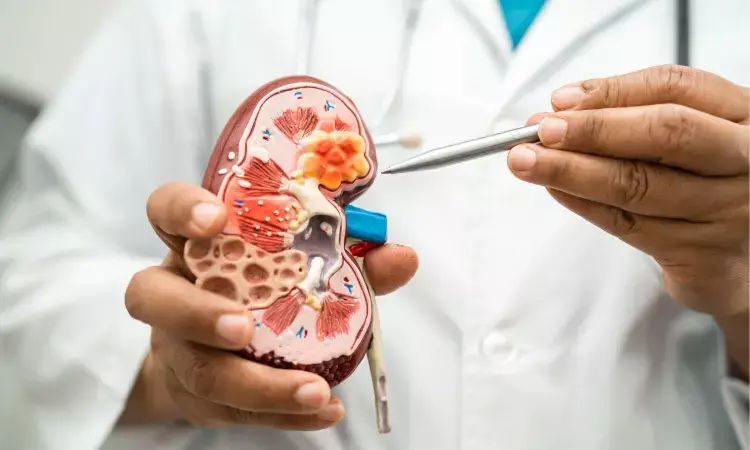- Home
- Medical news & Guidelines
- Anesthesiology
- Cardiology and CTVS
- Critical Care
- Dentistry
- Dermatology
- Diabetes and Endocrinology
- ENT
- Gastroenterology
- Medicine
- Nephrology
- Neurology
- Obstretics-Gynaecology
- Oncology
- Ophthalmology
- Orthopaedics
- Pediatrics-Neonatology
- Psychiatry
- Pulmonology
- Radiology
- Surgery
- Urology
- Laboratory Medicine
- Diet
- Nursing
- Paramedical
- Physiotherapy
- Health news
- Fact Check
- Bone Health Fact Check
- Brain Health Fact Check
- Cancer Related Fact Check
- Child Care Fact Check
- Dental and oral health fact check
- Diabetes and metabolic health fact check
- Diet and Nutrition Fact Check
- Eye and ENT Care Fact Check
- Fitness fact check
- Gut health fact check
- Heart health fact check
- Kidney health fact check
- Medical education fact check
- Men's health fact check
- Respiratory fact check
- Skin and hair care fact check
- Vaccine and Immunization fact check
- Women's health fact check
- AYUSH
- State News
- Andaman and Nicobar Islands
- Andhra Pradesh
- Arunachal Pradesh
- Assam
- Bihar
- Chandigarh
- Chattisgarh
- Dadra and Nagar Haveli
- Daman and Diu
- Delhi
- Goa
- Gujarat
- Haryana
- Himachal Pradesh
- Jammu & Kashmir
- Jharkhand
- Karnataka
- Kerala
- Ladakh
- Lakshadweep
- Madhya Pradesh
- Maharashtra
- Manipur
- Meghalaya
- Mizoram
- Nagaland
- Odisha
- Puducherry
- Punjab
- Rajasthan
- Sikkim
- Tamil Nadu
- Telangana
- Tripura
- Uttar Pradesh
- Uttrakhand
- West Bengal
- Medical Education
- Industry
Higher serum Lipoprotein A level independent risk factor for mildly reduced eGFR

Chronic kidney disease (CKD) is a prevalent global health issue, affecting 10% of the adult population worldwide, with a 29.3% increase in prevalence from 1990 to 2017. This condition is associated with an increased risk of mortality and cardiovascular disease (CVD). Early identification and prevention of CKD are crucial.
Hong Zhang et al., in a recent study published in BMC Nephrology, have found that higher Lp(a) levels in Chinese people (middle-aged and elderly) have an association with an increased risk of mildly reduced eGFR, revealing the importance of evaluating and managing Lp(a) for early renal dysfunction detection.
One thousand sixty-four participants aged 40 years or older from Yonghong Community, China, were enrolled.eGFR levels between 60 and 90 mL/min/1.73m2 were considered mildly reduced eGFR. Lipoprotein (a) and eGFR data were collected through standardized questionnaires and biochemical measurements. The lipoprotein(a) concentration was determined using the latex-enhanced immunoturbidimetric test.
Key findings of this study are:
- Study participants included 370 men, constituting 34.8% of the mean age of 66.
- There was an association between Lp(a) levels and the risk of mildly reduced eGFR.
- Following adjustments for confounder, individuals with the highest tertile of Lp(a) had higher odds of mildly reduced eGFR with an adjusted odds ratio of 1.80 compared to the lowest tertile of Lp(a).
- Multivariable logistic regression of studies with continuous Lp(a) variables showed consistent results with an adjusted OR of 1.23.
Our community-based cross-sectional study found a significant association between Lp(a) levels and the risk of mildly reduced eGFR. We would collect more information about diet and medication history in the follow-up, the authors write.
Our study has limitations, including a cross-sectional design, multiple subtypes of Lp(a), and unclear relationships between subtypes and mildly reduced eGFR, including only middle-aged and elderly Chinese participants and albuminuria, was not included in our study, they said.
Reference:
Zhang et al. Association between serum lipoprotein(a) and mildly reduced eGFR: a cross-sectional study. BMC Nephrol 24, 364.
BDS, MDS in Periodontics and Implantology
Dr. Aditi Yadav is a BDS, MDS in Periodontics and Implantology. She has a clinical experience of 5 years as a laser dental surgeon. She also has a Diploma in clinical research and pharmacovigilance and is a Certified data scientist. She is currently working as a content developer in e-health services. Dr. Yadav has a keen interest in Medical Journalism and is actively involved in Medical Research writing.
Dr Kamal Kant Kohli-MBBS, DTCD- a chest specialist with more than 30 years of practice and a flair for writing clinical articles, Dr Kamal Kant Kohli joined Medical Dialogues as a Chief Editor of Medical News. Besides writing articles, as an editor, he proofreads and verifies all the medical content published on Medical Dialogues including those coming from journals, studies,medical conferences,guidelines etc. Email: drkohli@medicaldialogues.in. Contact no. 011-43720751


